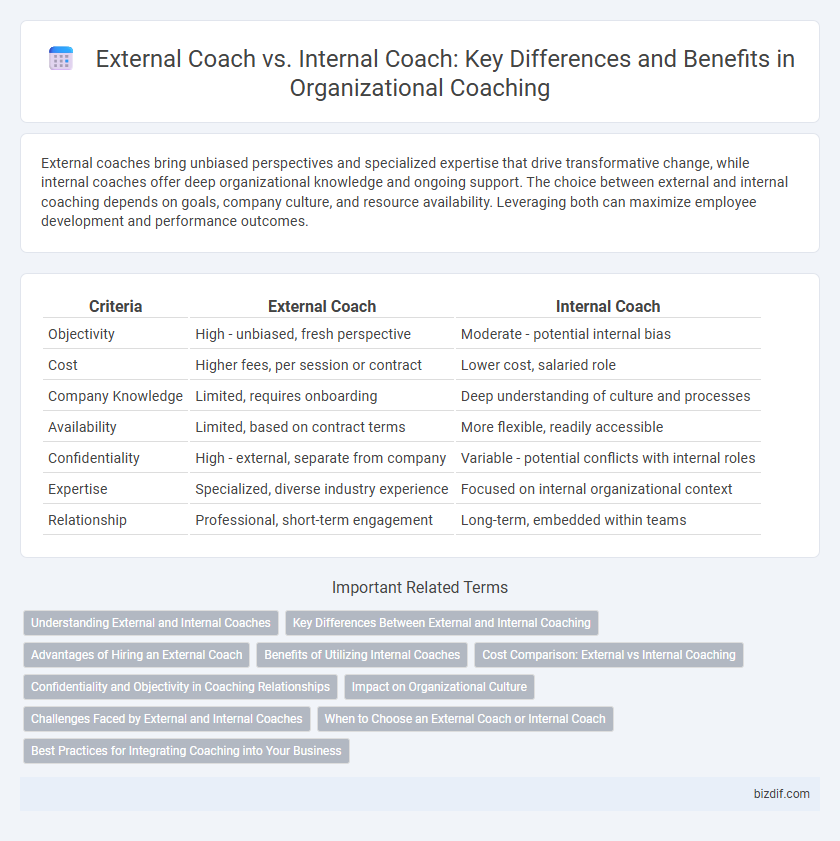External coaches bring unbiased perspectives and specialized expertise that drive transformative change, while internal coaches offer deep organizational knowledge and ongoing support. The choice between external and internal coaching depends on goals, company culture, and resource availability. Leveraging both can maximize employee development and performance outcomes.
Table of Comparison
| Criteria | External Coach | Internal Coach |
|---|---|---|
| Objectivity | High - unbiased, fresh perspective | Moderate - potential internal bias |
| Cost | Higher fees, per session or contract | Lower cost, salaried role |
| Company Knowledge | Limited, requires onboarding | Deep understanding of culture and processes |
| Availability | Limited, based on contract terms | More flexible, readily accessible |
| Confidentiality | High - external, separate from company | Variable - potential conflicts with internal roles |
| Expertise | Specialized, diverse industry experience | Focused on internal organizational context |
| Relationship | Professional, short-term engagement | Long-term, embedded within teams |
Understanding External and Internal Coaches
External coaches bring specialized expertise and an unbiased perspective to organizational development, often delivering tailored programs without internal conflicts of interest. Internal coaches leverage deep knowledge of company culture and employee dynamics, facilitating more accessible and sustained coaching relationships within the organization. Understanding the distinct advantages and limitations of external and internal coaches enables organizations to strategically align coaching resources with specific leadership development goals.
Key Differences Between External and Internal Coaching
External coaches bring unbiased perspectives and specialized expertise, often leading to fresh insights and innovative strategies, while internal coaches possess deep organizational knowledge and stronger cultural alignment, fostering trust and long-term development. External coaching typically involves higher costs and flexible engagement, contrasted with the cost-effectiveness and immediate availability of internal coaches embedded within the company. The choice impacts confidentiality, accountability, and goal-setting dynamics, influencing overall coaching effectiveness and employee growth outcomes.
Advantages of Hiring an External Coach
Hiring an external coach brings unbiased perspectives and specialized expertise tailored to diverse industries, fostering innovative solutions and overcoming internal blind spots. External coaches offer confidentiality that encourages openness and candid feedback, enhancing personal and organizational growth. Their broader experience with multiple clients facilitates the introduction of best practices and proven strategies for accelerated development.
Benefits of Utilizing Internal Coaches
Internal coaches bring deep organizational knowledge, enabling tailored development that aligns with company culture and strategic goals. Their ongoing presence fosters trust and quick feedback loops, enhancing employee engagement and accelerating skill transfer. Utilizing internal coaches reduces costs associated with external hires and ensures consistent coaching methodologies across teams.
Cost Comparison: External vs Internal Coaching
External coaching typically incurs higher direct costs due to fees charged by professional coaches or coaching firms, often ranging from $200 to $500 per hour. Internal coaching, while usually generating lower immediate expenses, involves indirect costs such as time spent by managers or HR personnel fulfilling coaching roles in addition to their regular duties. Organizations must weigh the upfront price difference against potential productivity impacts when choosing between external and internal coaching solutions.
Confidentiality and Objectivity in Coaching Relationships
External coaches often provide higher confidentiality due to their independence from the organization, ensuring sensitive information remains private. Internal coaches may face challenges maintaining objectivity as they are embedded within the company's culture and dynamics. Prioritizing confidentiality and objectivity enhances trust and effectiveness in coaching relationships, crucial for achieving meaningful developmental outcomes.
Impact on Organizational Culture
External coaches bring fresh perspectives and specialized expertise, helping to introduce innovative practices that can challenge and evolve the existing organizational culture. Internal coaches possess a deep understanding of company values and history, which allows them to embed cultural alignment more seamlessly into development processes. The choice between external and internal coaching significantly shapes how cultural transformation initiatives are received and sustained within the organization.
Challenges Faced by External and Internal Coaches
External coaches often face challenges such as limited organizational knowledge and reduced access to company culture, which can hinder personalized interventions and trust-building with clients. Internal coaches struggle with potential bias, conflicts of interest, and balancing dual roles within the same organization, affecting confidentiality and client openness. Both must navigate distinct boundaries while maintaining effectiveness in leadership development and performance improvement.
When to Choose an External Coach or Internal Coach
Choosing between an external coach and an internal coach depends on factors such as confidentiality, objectivity, and organizational knowledge. External coaches bring unbiased perspectives and specialized expertise, ideal for sensitive leadership development or when fresh insights are needed. Internal coaches leverage deep understanding of company culture and internal dynamics, making them suitable for ongoing employee growth and performance improvement within the organization.
Best Practices for Integrating Coaching into Your Business
Integrating coaching into your business requires distinguishing between external and internal coaches to maximize effectiveness. External coaches bring unbiased perspectives and specialized expertise, while internal coaches offer deep organizational knowledge and continuous availability. Best practices include aligning coaching goals with business objectives, establishing clear communication channels, and regularly evaluating coaching impact through performance metrics and employee feedback.
External Coach vs Internal Coach Infographic

 bizdif.com
bizdif.com